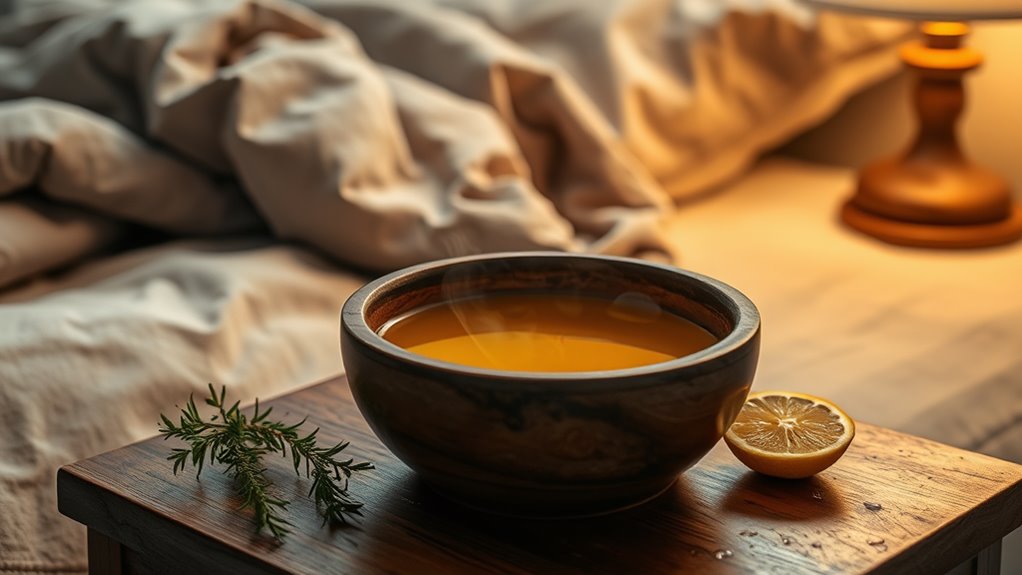Natural Cough Remedy That Helped Me Sleep Through the Night
Imagine lying in bed, the quiet night interrupted only by your relentless cough. It’s frustrating, isn’t it? Many people face this struggle, but there are natural remedies that can turn your sleepless nights into restful ones. One such remedy, honey, has been shown to soothe irritation and ease coughing. Curious about how simple adjustments to your routine can enhance your sleep and health? Let’s explore these effective strategies together.
Key Takeaways
- A spoonful of honey before bed can soothe your throat and reduce nighttime coughing effectively.
- Maintaining proper humidity levels using a humidifier can alleviate throat irritation and improve sleep quality.
- Creating a sleep-friendly environment with optimal temperature and minimal noise enhances overall restfulness and recovery.
- Essential oils like lavender and eucalyptus can promote relaxation and clear airways, aiding better sleep.
- Staying hydrated throughout the day helps thin mucus and reduces throat discomfort during the night.
Understanding the Causes of Coughing at Night
When you settle down for the night, a persistent cough can disrupt your sleep and leave you feeling restless. Understanding the causes of nighttime coughing is essential for finding relief.
Common culprits include post-nasal drip, which occurs when mucus drips down your throat, and allergies that trigger inflammation. Acid reflux can also cause irritation, leading to coughing as you lie down. Additionally, dry air can exacerbate throat irritation. Incorporating steam inhalation can help clear airways and provide soothing relief from coughing.
Identifying these causes helps you choose effective natural cough remedies. For instance, honey can soothe your throat, while steam inhalation hydrates the airways. Staying hydrated with warm liquids and using a humidifier can also provide relief. Maintaining a diet rich in fruits and vegetables supports overall health and boosts your immune system, further aiding in cough relief.
The Importance of Sleep for Recovery
Getting enough sleep is essential for your immune system, as it helps your body fight off infections more effectively. When you rest, your body enters a healing phase that speeds up recovery, allowing you to bounce back faster from illnesses like a persistent cough. Prioritizing sleep not only enhances your overall well-being but also accelerates your healing process. Incorporating calming activities into your bedtime routine can further improve sleep quality and support your recovery. Additionally, ensuring a consistent bedtime can significantly contribute to a more restorative sleep experience.
Sleep and Immune Function
Sleep plays an essential role in your immune function, serving as the body’s natural recovery mechanism. When you prioritize quality sleep, you’re boosting your immune response, which is vital for fighting off illnesses.
Here are a few key benefits of sleep for your immune system:
-
Enhanced Antibody Production: Sleep helps your body produce antibodies that fight infections effectively.
-
Increased Cytokine Release: During sleep, your body releases proteins called cytokines, which help regulate immune responses.
-
Reduced Inflammation: Adequate sleep can lower inflammation, allowing your body to focus on healing.
Impact on Healing Process
While many might underestimate the power of rest, it’s essential for effective recovery from illness or injury.
Sleep plays a critical role in healing, as your body uses this time to repair tissues and strengthen your immune system. Research shows that adequate sleep enhances the production of cytokines, proteins that help combat infections and inflammation.
When you’re well-rested, your body can focus its energy on recovery, reducing the duration and severity of your illness. Conversely, lack of sleep can hinder this process, prolonging recovery and increasing susceptibility to further complications.
Prioritizing sleep, especially when you’re unwell, can profoundly impact your healing journey, allowing you to bounce back stronger and healthier.
Honey and Its Soothing Properties
When you’re dealing with a nagging cough, honey can be a soothing ally. This natural remedy not only tastes great but also offers several benefits that help ease your symptoms.
Here’s why you should consider honey:
-
Antimicrobial properties: Honey can fight off bacteria and viruses, helping to reduce the duration of your cough. Additionally, its natural antibacterial properties make it an effective remedy for throat discomfort.
-
Soothes throat irritation: Its thick consistency coats your throat, alleviating irritation and providing instant relief.
-
Promotes better sleep: A spoonful of honey before bed can help you sleep better by reducing nighttime coughing. Additionally, honey’s antimicrobial properties can enhance its effectiveness in relieving cough symptoms. Research shows that honey may be as effective as over-the-counter cough syrups, making it a great, natural alternative.
Herbal Teas That Promote Relaxation
If you’re looking for a comforting way to unwind, herbal teas can be a delightful addition to your routine.
Chamomile tea is a popular choice, known for its calming effects, which can help reduce anxiety and improve sleep quality. Studies show that quality sleep significantly impacts physical health and cognitive function, making chamomile an excellent choice for enhancing rest.
Lavender tea also promotes relaxation, thanks to its soothing aroma and potential to lower heart rate. The calming scents of lavender can enhance relaxation and create a peaceful environment for sleep.
If you prefer something a bit spicier, ginger tea can aid digestion while providing a cozy warmth. This warming effect can be particularly soothing during colder months, making it a comforting evening beverage.
Additionally, lemon balm tea is thought to alleviate stress and boost mood. Incorporating calming properties into your evening routine can significantly enhance your sleep quality. Each of these herbal teas has been backed by studies, demonstrating their effectiveness in promoting relaxation and enhancing your overall well-being.
Humidity and Its Impact on Coughing
Humidity plays an essential role in how your body responds to coughing.
When the air is too dry, it can irritate your throat and make your cough worse. Using a humidifier can help maintain ideal moisture levels, easing your symptoms and promoting better respiratory health. Additionally, maintaining optimal air moisture levels in your living space can significantly reduce irritation and inflammation in your respiratory system. Incorporating steam therapy can also provide immediate relief by opening nasal passages and soothing airways.
Role of Humidity
While many factors contribute to coughing, the role of humidity is often overlooked yet essential. Proper humidity levels can help soothe your throat and airways, making it easier to breathe. When the air is too dry, irritation can lead to increased coughing and discomfort.
Consider these points:
-
Moisture Balance: Adequate humidity keeps your throat moist, reducing irritation.
-
Mucus Thinning: Humid air can help thin mucus, allowing for easier expulsion.
-
Comfortable Breathing: Proper humidity levels create a more comfortable environment, which can reduce nighttime coughing.
Dry Air Effects
When dry air fills your environment, it can considerably impact your respiratory health, often leading to persistent coughing. Dry air can irritate your throat and nasal passages, making them feel scratchy and inflamed. This irritation triggers your body to cough, which can disrupt your sleep and overall well-being.
| Effects of Dry Air | Symptoms Experienced |
|---|---|
| Irritated Airways | Persistent Cough |
| Increased Mucus | Nasal Congestion |
| Throat Dryness | Sore Throat |
| Reduced Lung Function | Shortness of Breath |
To combat these effects, consider staying hydrated and limiting exposure to dry environments. Recognizing these impacts can help you take proactive steps for better respiratory health.
Humidifier Benefits
Using a humidifier can greatly improve your respiratory comfort, especially in dry environments that exacerbate coughing. By adding moisture to the air, you can ease irritation in your throat and nasal passages.
Here are some key benefits of using a humidifier:
-
Reduces throat irritation: Moist air helps soothe scratchy throats, making it easier to breathe.
-
Loosens mucus: Increased humidity can help thin mucus, allowing for easier clearance from your airways.
-
Improves sleep quality: A comfortable humidity level can lead to better sleep, reducing nighttime coughing fits.
Essential Oils for Relief and Sleep
Essential oils can be a powerful ally in alleviating cough symptoms and promoting restful sleep. Oils like lavender, eucalyptus, and peppermint are particularly effective.
Lavender’s calming properties help reduce anxiety and improve sleep quality. Eucalyptus can clear airways, making it easier to breathe, while peppermint acts as a natural decongestant.
To use these oils, try adding a few drops to your diffuser before bedtime or mixing them with a carrier oil for a soothing chest rub. You can also place a cotton ball with essential oil near your pillow for inhalation throughout the night.
Just remember to consult with a healthcare professional before using essential oils, especially if you have underlying health conditions or are pregnant.
The Role of Hydration in Cough Management
Staying hydrated plays an essential role in managing cough symptoms effectively. When you drink enough fluids, you help thin mucus and keep your throat moist, which can ease irritation.
Here’s why staying hydrated is vital:
-
Soothes the throat: Warm fluids like tea can reduce discomfort and provide relief.
-
Loosens mucus: Proper hydration helps break down mucus, making it easier to expel. Additionally, drinking herbal teas can offer antiviral and expectorant properties for cough relief.
-
Boosts immunity: Staying hydrated supports overall health, allowing your body to fight off infections more efficiently. Moreover, hydration helps thin mucus and keeps the throat moist, which is crucial during a cold.
Make sure to drink water, herbal teas, or broths throughout the day.
Creating a Sleep-Friendly Environment
A comfortable sleep environment can greatly enhance your ability to rest, especially when dealing with a cough.
Start by keeping your bedroom cool, ideally between 60 and 67 degrees Fahrenheit, as this temperature promotes better sleep. Use blackout curtains to block out light, and consider a sound machine or a fan to drown out disruptive noises.
Make sure your mattress and pillows offer the right support to avoid any discomfort that could worsen your cough. Additionally, maintaining low humidity levels can prevent mold growth and allergens, which may irritate your throat. Cold air can also dry out your nasal passages, making it harder to breathe comfortably at night, so a humidifier may be beneficial.
Finally, keep your space clutter-free and calming, using soft colors and minimal distractions to create a soothing atmosphere that encourages relaxation and restful sleep. Incorporating calming scents like lavender can also enhance your sleep environment and promote relaxation.
Personal Experiences and Tips for Better Sleep
Many people find that small changes in their bedtime routine can lead to considerably better sleep quality. You might want to try these tips in order to enhance your sleep experience:
-
Limit screen time: Reducing exposure to screens at least an hour before bed can help your body produce melatonin, improving your sleep onset.
-
Establish a wind-down routine****: Engaging in calming activities, like reading or meditating, signals your body that it’s time to relax.
-
Keep a consistent sleep schedule****: Going to bed and waking up at the same time daily helps regulate your internal clock, making it easier to fall asleep.
Implementing these strategies can transform your nights, leading to more restful sleep and better overall health. Give them a shot!




